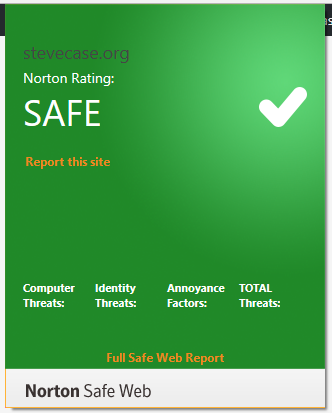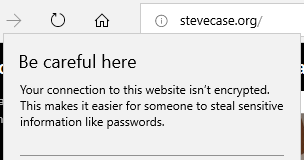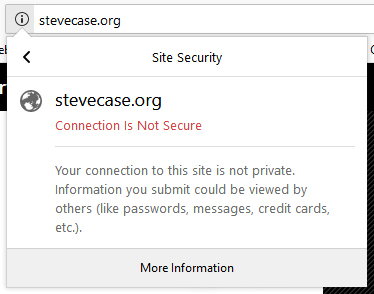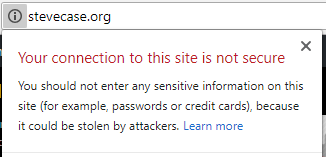Google’s priorities are not always the same as mine. Trust, security, compatibility, and safety are all important, and the terms are sometimes used somewhat interchangeably.
Trust and Safety

This is about as safe a site as you will find. Everyone is free to come here. No account or password is required. There’s no advertising, and I’m not selling anything.
Thanks to that, the search engines and browsers haven’t cared that a secure connection isn’t created when you visit here.
Norton Safe Web has dubbed the site SAFE, without threats or even “annoyance factors.” That doesn’t mean nobody will be annoyed by anything they find here. Norton defines annoyance factors as “Items that don’t necessarily do harm, but are a nuisance, such as joke programs or a site that isn’t what it seems.”
Steve Case is Insecure
Actually, I’m fine – and so is the other Steve Case. However, Google’s Chrome browser warns that SteveCase.org is not secure.
Google likes that this site is mobile-friendly. It works well with smart phones and other mobile devices. However, Google has been raising the bar, expecting more and more types of web sites to support secure connections.
Secure Web Site Connections
Though you probably haven’t been greeted with warnings when you visit this site, you might have seen warnings if you clicked the information button next to the site name.
Microsoft’s Edge browser gives cautious guidance:

Mozilla’s Firefox browser is more pointed, with warning text in red:

Google’s Chrome browser is more pointed still, with larger and more prominent red warning text:

What’s Next
Google has been saying that the warnings will become more pointed:
Beginning in July 2018 with the release of Chrome 68, Chrome will mark all HTTP sites as “not secure”.
That means sites that still use HTTP rather than HTTPS will receive increasingly prominent warnings from web browsers. That doesn’t mean you shouldn’t visit a given site. It does mean you shouldn’t enter passwords PINs, financial or medical information there. Reputable sites that sell something or require passwords have already added HTTPS security.


Hi Steve – I’m not sure why Google is doing this for sites that are not selling anything. It doesn’t seem fair for them to have to spend money to upgrade when they do not have forms or sales on them.
I wonder how and why this all came about.
Thanks for sharing about it with us!
I think of this as a Public Service Announcement Lisa. Google has been very public about their plans for years, but it’s easy for those of us that know our sites are safe to think the world knows that too. Now we just need to prove it to the browsers.
The problem with Google & the browsers is that they assume each of us has only one site. I have 5, and my host only gives me one free secure certificate. That means I’d have to pay $159 a year each for the other 4… and that’s not happening! I am selling stuff, but everyone’s directed to Paypal, which is secure; it’ll have to do for now… and probably forever (unless I strike it rich).
That’s not a great situation to be in. Knowing that the various browsers are going to be making it increasingly obvious only makes it more painful. Are you able to use one of the no-charge certificate services?